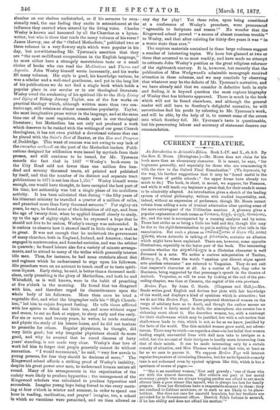CURRENT LITERATURE.
An Introduction to Aristotle's Ethics. Book I.-IV. and X., ch. 6-9. By the Rev. E. Moore. (Rivingtons.)—Mr. Moore does not claim for his book more than an elementary character. It is meant, he says, " for beginners generally, and especially for those who are commencing it with the view to the Oxford Final Examination." (We deprecate, by the way, his further suggestions that it may be " found useful in the upper forma of public schools ;" the upper forms have already too much to do.) The book, in short, is meant, we suppose, for Penmen, and while it will teach any beginner a great deal, for their needs it seems to be admirably adapted. An introduction gives a sketch of the leading system of ethical philosophy, written with studied impartiality, and, indeed, without an expression of preference, though Mr. Moore cannot refrain from adding a note of ironical admiration after quoting some of the more extravagant of the Utilitarian maxims. A glossary gives a popular explanation of such terms as ii6yaihig, Irpoalpeurc, &c., and the text is accompanied by a running analysis and by notes. These last strike us as being a little too bald and dry, though this may be due to the rigid determination to put in nothing but what tells in the examination. But such a phrase as ilriZocciCoral of axpor rii; *tiny x4pay, whore Aristotle is talking of 9Aorilkisc, contains an allusion which might have been explained. There are, however, some apposite illustrations, especially in the latter part of the book. The interesting- question whether the thEytair+exoc is a Christian character is well discussed in a note. We notice a curious misquotation of Tacitus, History, ii., 80, where the words "omniam pie diceret atque ageret arts quadam ostentator " are referred to Vespasian. They do not suit that emperor's character at all. As a matter of fact, they refer to Mucianus, being suggested by that personage's speech in the theatre of Antioch. Vespasian, as will be seen by looking at the end of the pre- ceding chapter, was then at Caesarea, the capital of his own province.


































 Previous page
Previous page